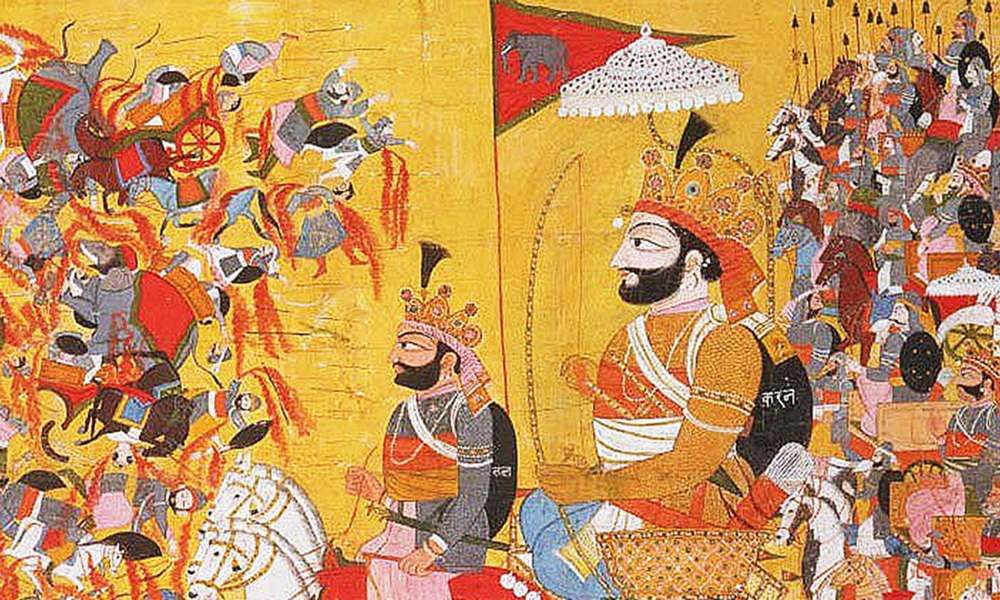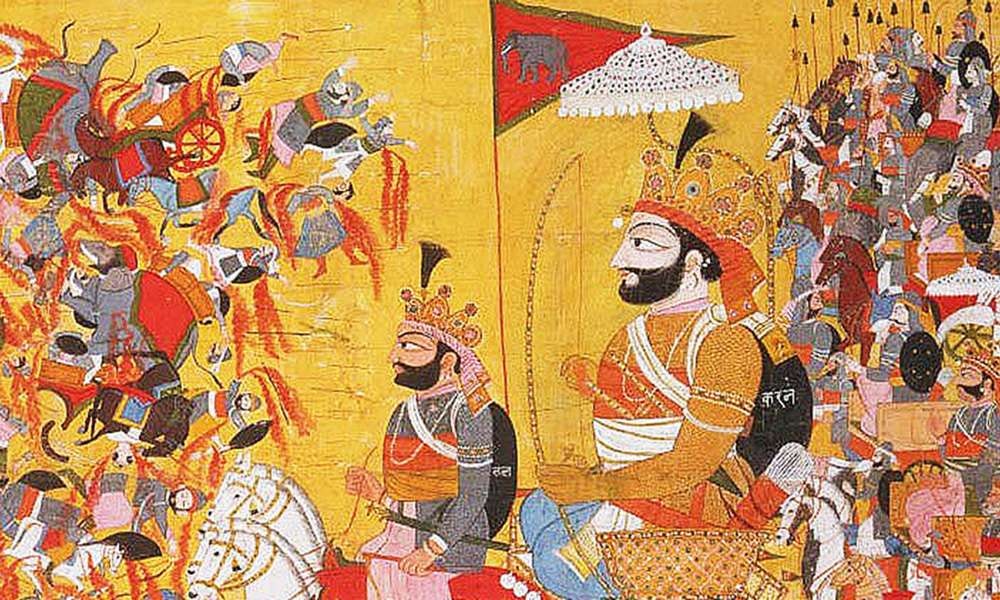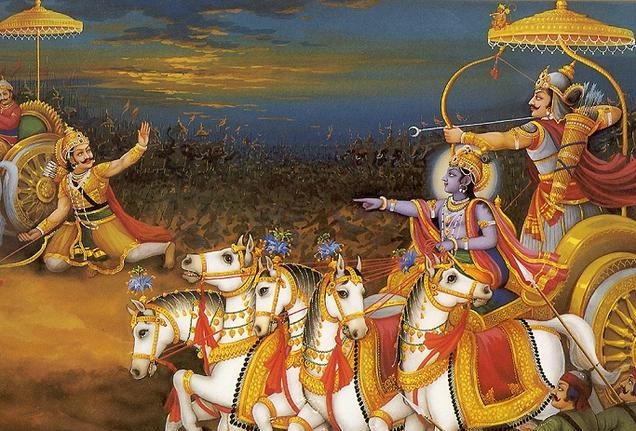Karna was appointed commander of the Kauravas and took charge of what was left of the Kaurava army on the sixteenth morning. His charioteer was the redoubtable Shalya – uncle of the Pandava brothers Nakula and Sahdeva. How the brother of Madri came to fight on the side of the Kauravas is a tale in itself, but how did the two warriors spend the morning before the battle resumed? Arjuna and Krishna had spent the time before the battle began by getting to understand the purpose of the battle itself. Krishna had delivered the eternal message of the Bhagvad Gita to Arjuna. How did Shalya and Karna spend the time on the sixteenth morning? By arguing. Shalya provoked Karna, comparing him to a child wanting to touch the sun, to “
a stupid jackal” shouting “
at a maned and angry lion.” The “
stupid jackal” being Karna, while the “
angry lion” was Arjuna.
How did Karna respond? Need we guess? Karna took Shalya’s bait, and thus began a long argument, a cacophony that was as ugly as the real battle being fought. Karna had the choicest of abuses for the king of Madra, Shalya, his charioteer – “
evil in nature“, “
You are stupid“, “
There are no good feelings in a Madraka“, “
He [a Madraka] always lies and is never straight.“, “
Noble women [Madrakas], according to their own wishes, mingle with men, known and unknown“, “
They drink liquor, eat the flesh of cows and dance and laugh. The songs don’t have proper rhymes“, “
Women who are intoxicated by liquor cast off their clothes and dance around. … O Madraka! You are the son of one such“, “
They drink liquor made from grain and molasses. They eat the flesh of cows, laced with garlic. They eat bread mixed with meat and fried barley that has not been sowed.”
On and on went the bickering. Shalya recounted a tale about a crow and swan, comparing Karna to the crow “
that fed on leftovers from a vaishya household.” Karna, in Shalya’s estimation, was no different, and had “
subsisted on leftovers from the sons of Dhritarashtra.”
This then was Karna’s state of mind as he entered the battlefield.
How did the end come? In the middle of the furious battle, Parashurama’s curse manifested itself, as did the brahmana’s. “
the earth swallowed up one of the wheels of Radheya’s chariot.” Karna “
wept in rage.” An anjalika arrow, invoked with the right mantras, affixed to Arjuna’s Gandiva, severed Karna’s head.
Karna was the eldest of the four sons of Kunti. He was elder to Arjuna, Bhimasena, and Yudhishthira. Yet his lifelong battle had been with Arjuna. If one looks at Arjuna, the image most likely to be imprinted on the minds of people would be of Arjuna in a chariot commandeered by Krishna, who held the reins of the horses of the splendid chariot. The image cannot, but remind oneself of these lines from the Katha Upanishad:
“
Know the Self as lord of the chariot,
The body as the chariot itself,
The discriminating intellect as
The charioteer, and the mind as reins.
The senses, say the wise, are the horses;
Selfish desires are the road they travel.
When the Self is confused with the body,
Mind, and senses, they point out, he seems
To enjoy pleasure and suffer sorrow.” [Katha Upanishad, tr. Eknath Easwaran]
How did Karna respond? Need we guess? Karna took Shalya’s bait, and thus began a long argument, a cacophony that was as ugly as the real battle being fought. Karna had the choicest of abuses for the king of Madra, Shalya, his charioteer – “
evil in nature“, “
You are stupid“, “
There are no good feelings in a Madraka“, “
He [a Madraka] always lies and is never straight.“, “
Noble women [Madrakas], according to their own wishes, mingle with men, known and unknown“, “
They drink liquor, eat the flesh of cows and dance and laugh. The songs don’t have proper rhymes“, “
Women who are intoxicated by liquor cast off their clothes and dance around. … O Madraka! You are the son of one such“, “
They drink liquor made from grain and molasses. They eat the flesh of cows, laced with garlic. They eat bread mixed with meat and fried barley that has not been sowed.”
On and on went the bickering. Shalya recounted a tale about a crow and swan, comparing Karna to the crow “
that fed on leftovers from a vaishya household.” Karna, in Shalya’s estimation, was no different, and had “
subsisted on leftovers from the sons of Dhritarashtra.”
This then was Karna’s state of mind as he entered the battlefield.
How did the end come? In the middle of the furious battle, Parashurama’s curse manifested itself, as did the brahmana’s. “
the earth swallowed up one of the wheels of Radheya’s chariot.” Karna “
wept in rage.” An anjalika arrow, invoked with the right mantras, affixed to Arjuna’s Gandiva, severed Karna’s head.
Karna was the eldest of the four sons of Kunti. He was elder to Arjuna, Bhimasena, and Yudhishthira. Yet his lifelong battle had been with Arjuna. If one looks at Arjuna, the image most likely to be imprinted on the minds of people would be of Arjuna in a chariot commandeered by Krishna, who held the reins of the horses of the splendid chariot. The image cannot, but remind oneself of these lines from the Katha Upanishad:
“
Know the Self as lord of the chariot,
The body as the chariot itself,
The discriminating intellect as
The charioteer, and the mind as reins.
The senses, say the wise, are the horses;
Selfish desires are the road they travel.
When the Self is confused with the body,
Mind, and senses, they point out, he seems
To enjoy pleasure and suffer sorrow.” [Katha Upanishad, tr. Eknath Easwaran]
The contrast between Karna and Arjuna could not have been starker. All through his life, although Karna was a man, who possessed the greatest of talents, he could not bring himself to focus with single-minded attention to any one task. Distracted, he killed a calf, and got cursed. In the Kuru dyuta sabha, he could not keep his mouth shut, ordering Duhshasana to disrobe Droupadi. At Virata, he could not go after Brihanalla, and got distracted in arguing with Drona. Later, before the Kurukshetra battle, he would not ignore Drona and Bhishma’s taunts and walked off the battlefield in a huff. While on the one hand Krishna had dispelled the demons of doubt that raged in Arjuna’s mind at the start of the battle, Shalya, on the other hand, filled Karna’s mind with rage, doubt, and fear.
Thus, when Karna’s end came, the “
Self“, for all practical purposes, had already dismounted the “
body“. The “
intellect” had refused to cooperate with the “
Self“, as we witnessed. Karna was a distracted person. In a final assessment, the only thing that separated Karna from Arjuna was focus. One possessed an “intellect” as Krishna, the other Shalya. Shalya himself had not exactly distinguished himself, when he had allowed himself to get fooled by Duryodhana, had he? Karna chose such a person as his charioteer. A starker contrast between the marriage of the self and intellect could not be found than what was on display with Jishnu and Vishnu on the one hand, and Karna and Shalya on the other.
A last question that reinforces this contrast was raised by Dhritarashtra himself, when he asked Sanjaya after Ghototakacha had been killed by Karna’s Shakti weapon. He wanted to know from Sanjaya, “
Why did he [Karna] not forget everyone else and hurl it [Indra’s spear] at Partha? Had he been slain, all the Pandavas and Srinjayas would have been killed too. Had that brave one alone been killed, why should victory in the battle not have been ours?” The answer was provided by Krishna himself, to a similar question posed by Satyaki – “
The thought of killing the wielder of Gandiva was always in Karna’s heart. O foremost among warriors! But I confused Radheya.” Through his yogic powers, Krishna had been able to distract Karna’s mind. Day after day, for four days, till Karna had been forced to use the Shakti against Ghatotakacha.
I forgot to mention one thing. When Bhishma had assessed Karna’s capabilities, Drona had also weighed in. Before rating Karna as “
half a ratha,” Drona had said this about Karna, to Karna himself – “
Karna is generous. But he is also distracted.”
Drona had said this about Karna, to Karna himself - "Karna is generous. But he is also distracted."

indiafacts.org




